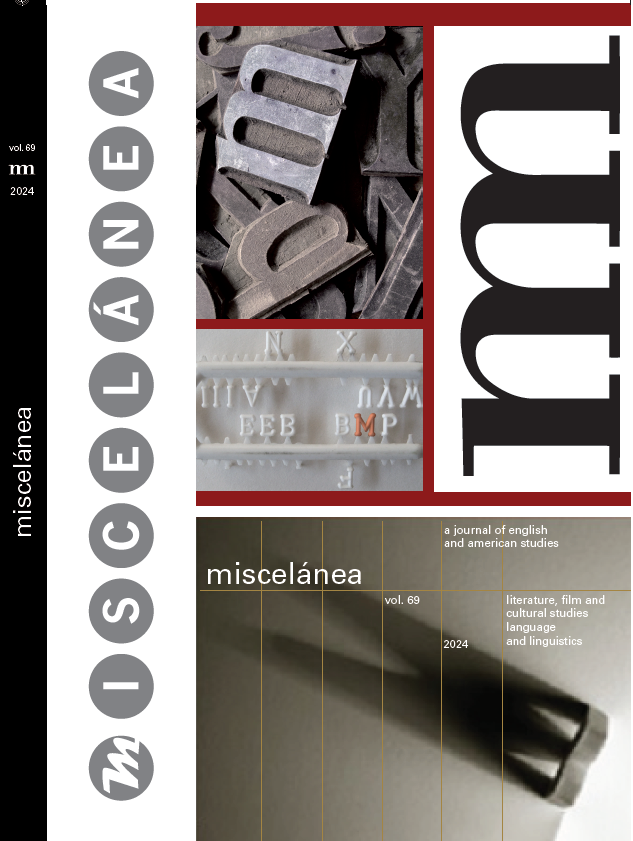La relación recíproca entre la ciudad y sus habitantes en The Lonely Londoners de Sam Selvon y What We All Long for de Dionne Brand
DOI:
https://doi.org/10.26754/ojs_misc/mj.20249566Palabras clave:
The Lonely Londoners, What We All Long For, entorno geográfico, identidad, espacio urbano.Resumen
Este artículo busca examinar la importancia del entorno geográfico en el que se desarrollan las obras The Lonely Londoners (2006 [1956]) de Sam Selvon y What We All Long For (2005) de Dionne Brand para así entender la recíproca e innegable relación que existe entre los sujetos y las ciudades que éstos habitan. Con este fin pretendo analizar el papel desempeñado por las ciudades de Londres y Toronto en la construcción y el desarrollo de las identidades de sus habitantes, así como el poder que los ciudadanos tienen a la hora de (re)diseñar los espacios urbanos. El artículo pretende examinar el carácter dinámico y fluido de la ciudad y busca identificar los efectos que tienen las comunidades migrantes en el proceso de reescribir y recartografiar los espacios urbanos a través del ejercicio de su agencia.
Descargas
Referencias
Ahmed, Sara. 2010. The Promise of Happiness. Durham: Duke U.P.
Bannerji, Himani. 2000. The Dark Side of the Nation: Essays on Multiculturalism, Nationalism and Gender. Toronto: Canadian Scholars’ Press.
Bayat, Asef. 2009. “Cairo Cosmopolitan: Living Together through Communal Divide, Almost”. In Mayaram, Shail (ed.) The Other Global City. New York: Routledge: 179-201. <https://doi.org/10.4324/9780203887653>.
Brah, Avtar. 1996. Cartographies of Diaspora: Contesting Identities. London: Routledge.
Brand, Dionne. 2001. A Map to the Door of No Return: Notes to Belonging. Toronto: Vintage Canada.
Brand, Dionne. 2005. What We All Long For. New York: Thomas Dunne Books.
Carrera Suárez, Isabel. 2008. “Toronto in the Global City: Flows and Places in Dionne Brand’s What We All Long For”. In Sturgess, Charlotte and Martin Kuester (eds.) Reading(s) from a Distance: European Perspectives on Canadian Women’s Writing. Augsburg: Wißner: 187-199. <http://dx.doi.org/10.1080/1369801X.2014.998259>.
Carrera Suárez, Isabel. 2015. “The Stranger Flâneuse and the Aesthetics of Pedestrianism”. Interventions 17 (6): 853-865. <https://doi.org/10.1080/1369801X.2014.998259>.
Chambers, Iain. 1994. Migrancy, Culture, Identity. London and New York: Routledge.
De Certeau, Michel. 1984. The Practice of Everyday Life. Trans. S. Rendall. Berkeley: University of California Press.
Dyer, Rebecca. 2002. “Immigration, Postwar London, and the Politics of Everyday Life in Sam Selvon’s Fiction”. Cultural Critique 52 (Fall): 108-144. <http://dx.doi.org/10.1353/cul.2003.0006>.
Fellner, M. Astrid. 2010. “‘Translating Toronto on a Bicycle’: Dionne Brand’s What We All Long For and the Challenges of Urbanity”. REAL: Yearbook of Research in English and American Literature 26: 231-244.
García Zarranz, Libe. 2014. “‘The Whole City’s our Bawdy-House, My Lass’: Affective Spaces and Disoriented Bodies in Dionne Brand and Emma Donoghue’s Fictions”. Peer English: A Journal of New Critical Thinking 9: 89-107.
Habchi, Fadila. 2022. “Spaces of Masculine Intimacies in Samuel Selvon’s The Lonely Londoners”. In Nixon, Jude V. and Mariaconcetta Costantini (eds.) Becoming Home Diaspora and the Anglophone Transnational. Delaware: Vernon Press: 75-90.
Hartman, Saidiya. 2002. “The Time of Slavery”. South Atlantic Quarterly 101 (4): 757-777. <https://doi.org/10.1215/00382876-101-4-757>.
Johansen, Emily. 2008. “‘Streets are the dwelling place of the collective’: Public Space and Cosmopolitan Citizenship in Dionne Brand’s What We All Long For”. Canadian Literature 196 (Spring): 48-62. <https://doi.org/10.14288/cl.v0i196>.
Kabesh, Lisa M. 2011. “Mapping Freedom, or Its Limits: The Politics of Movement in Sam Selvon’s The Lonely Londoners”. Postcolonial Text 6 (3): 1-17.
Kelly, Kristine N. 2019. “Nomadic London: Reading Wandering in Sam Selvon’s The Lonely Londoners and Ben Okri’s ‘Disparities’”. Ariel: A Review of International English Literature 50 (1): 63-90. <https://doi.org/10.1353/ari.2019.0003>.
Lamming, George. 1998. “The Coldest Spring in Fifty Years: Thoughts on Sam Selvon and London”. Kunapipi 20 (1): 4-10.
Lefebv re, Henri. (1974) 1991. The Production of Space. Oxford: Blackwell.
Low, Setha, Dana Taplin and Suzanne Scheld. 2005. Rethinking Urban Parks: Public Space and Cultural Diversity. Texas: University of Texas Press. <https://www.jstor.org/stable/10.7560/706859>.
Massey, Doreen. 2005. For Space. London: Sage.
McKibbin, Molly Littlewood. 2008. “The Possibilities of Home: Negotiating City Spaces in Dionne Brand’s What We All Long For”. Journal of Black Studies 38 (3): 502-518. <https://www.jstor.org/stable/40034394>.
McLeod, John. 2004. “Making a Song and Dance: Sam Selvon and Colin MacInnes”. In McLeod, John (ed.) Postcolonial London: Rewriting the Metropolis. London and New York: Routledge: 24-55. <https://doi.org/10.4324/9780203335543>.
Meskimmon, Marsha. 1997. Engendering the City: Women Artists and Urban Space. London: Scarlet Press.
Mgbeadichie, Chike Francis and Ikechukwu Emmanuel Asika. 2011. “Idealism to Realism – Representing London in Black British Writing: Reading Samuel Selvon’s The Lonely Londoners”. An International Multidisciplinary Journal, Ethiopia 5 (6): 43-57 <http://dx.doi.org/10.4314/afrrev.v5i6.5>.
Moten, Fred. 2017. Black and Blur. Durham: Duke U.P.
Peach, Linden. 2004. The Contemporary Irish Novel: Critical Readings. New York: Palgrave.
Pooch, Melanie U. 2016. “Dionne Brand’s Toronto, What We All Long For”. In Pooch, Melanie U. (ed.) DiverCity – Global Cities as a Literary Phenomenon. Bielefeld: Transcript Verlag: 79-121.
Procter, James. 2003. Dwelling Places: Postwar Black British Writing. Manchester: Manchester U.P.
Rosenthal, Caroline. 2009. “Transgressing the ‘Poetics of the Anglicized City’: The Figure of the Flâneuse in Dionne Brand’s What We All Long For”. In Eibl, Doris G. and Caroline Rosenthal (eds.) Space and Gender. Innsbruck: Innsbruck U.P.: 231-245.
Roupa kia, Lydia Efthymia. 2015. “‘Art-iculating’ Affective Citizenship: Dionne Brand’s What We All Long For”. Atlantis 37 (1): 31-50. <https://www.jstor.org/stable/24757729>.
Sassen, Saskia. 1998. Globalization and Its Discontents. New York: The New Press.
Selv on, Samuel. (1956) 2006. The Lonely Londoners. London: Penguin Modern Classics.
Sharpe, Christina. 2016. In the Wake: On Blackness and Being. Durham: Duke U.P.
Tonkiss, Fran. 2005. Space, the City and Social Theory. Social Relations and Urban Forms. Cambridge and Malden: Polity.
Wolff, Janet. 1985. “The Invisible Flâneuse. Women and the Literature of Modernity”. Theory, Culture and Society 2 (3): 37-46.
Yancy, George. 2017. Black Bodies, White Gazes: The Continuing Significance of Race in America. Lanham: Rowman & Littlefield.
Descargas
Publicado
Número
Sección
Licencia
Derechos de autor 2024 Silvia Pérez

Esta obra está bajo una licencia internacional Creative Commons Atribución-NoComercial 4.0.


